Kathryn Mockler's Blog, page 16
February 18, 2025
Around Travis, we had to watch everything we said and did so as not to set off his Early Warning Uncoolness Alert System.
Lil was far too excited about her wedding-day Karla Homolka costume. Her eyes assumed a sadistic, possessive glint as she described the tacky veil and blonde wig she’d scored at Value Village. When she asked if I’d steal my mom’s industrial-strength hairspray to style the wig’s bangs, her irises floated to the northern hemispheres of her eyeballs—like Karla’s in her most sinister-looking photo, the one that had drenched the Edmonton Journal during her trial.
She doesn’t use it anymore, I said. You can have it.
Lil nodded. She seemed deflated and this pleased me. I wanted to suck the air out of anything related to her newly formed union with Stage Hand Luke. Stage Hand Luke was supposed to be the pretentious boy behind the counter at Blackbyrd Myoosik whom we feared while in the store and ridiculed the moment we left. In the before-times, Lil would step with me onto the sidewalk outside the record store, lower her voice into monotone Adam’s apple territory, and say something like, That album’s good … if you’re into the sound of hyenas fucking.
But since he’d winked at her at the Delores show, since he’d found out her last name in our Grade 11 yearbook, since he’d looked up her number in the White Pages, since he’d called three times pretending—in a high-pitched, nasal whine—to confirm a non-existent pizza delivery order and then called a fourth time and finally asked Lil to meet him for a cappuccino at Café La Gare—the smoking side—he was Stage Hand Luke no more. Once Lil became attached to him, we had to refer to him by his real name, Travis. Stage Hand Luke was Travis and Lil was Travis’s Girl and my world was tipped off its axis.
Since our Grade 10 year, Travis’s parents had taken a pilgrimage to Victoria at Hallowe’en to visit the site where Michelle, of Michelle Remembers fame, was possessed by Satan, thus leaving him home alone to throw an epic party. That year, he decided it would be murder themed and that he and Lil would dress up as Paul Bernardo and Karla Homolka. Before this unfortunate coupling, I had planned to be the axe to Lil’s Lizzie Borden.
What should I be? I asked Lil.
Ted Bundy?
He just looks like a normal person.
Lil sighed. That’s the problem. They all do.
A Manson girl?
Lil grabbed my ankle. I got it, she said. You should be Tammy.
Faye Bakker?
No. Lil rolled her eyes. Homolka, she said. My little sister.
The one you killed?
Lil nodded. This is so sick. Travis will love this.
*
Travis was not Lil’s first foray into the boy kingdom. A line of boys had trailed Lil like paper Ken-dolls since she’d grown a pair of perfectly spherical C-cup breasts in Grade 9. At that time, the state of my chest was such that I could’ve still legally run topless through the sprinkler in my front yard. Lil picked up boys on weekends at Scona Billiards, one of three cool places underage kids could hang out in Edmonton—the other two being the dollar theatre on the outskirts of town and the river valley, accompanied by a book of matches and the two-six of Jack Daniel’s our fathers kept misplacing and replacing. Inevitably, the greasiest boy would slither like a ferret between pool tables to ask Lil out. Lil wasn’t choosy about looks. What she wanted was attention, power—the power to derail a boy’s pool cue, to divert beer into his windpipe, to cause him to fumble his footing and embellish his intentions so she’d dispense her seven digits to him. Sometimes, because I was the quiet friend, the glasses-wearing friend, the underdeveloped friend, their sweaty, acne-ridden sidekicks would ask for my number, assuming I was easy. I gave out the number for Lil’s mother’s womyn-centred naturopathic clinic. If they called, a receptionist named Meadow would greet them with, Hello, how may we serve your vagina?
But none of those boys had lasted more than a few weeks. None altered her the way Travis did. In his presence, she existed under a malevolent, disaffected rain cloud. This dreary haze smeared out anything about her that didn’t fit Travis’s idea of the perfect girl—an unlikely specimen who looked like Kate Moss, danced like Kate Bush and was not repulsed by Beavis and Butt-Head. Lil straightened her fuzz of ringlets so they hung like vertical blinds around her face. She looked perpetually like a sad Basset Hound. She exchanged her kinderwhore style—ripped tights enveloped by Mary Janes, babydoll dresses whose hems kissed the elastic leg seams of her underwear and whose buttons yawned open at her cleavage, near-dreaded hair scattered with brightly coloured plastic barrettes like bird berries in a dung heap—for Travis’s Indie-Rock style. Lil trawled Value Village for 80s hair metal band T-shirts she could wear ironically, she covered her planks of straightened hair with an oversized Oilers toque and she wore a pair of tight Levis whose threaded holes her ass cheeks bulged from like desperate inmates.
Around Travis, we had to watch everything we said and did so as not to set off his Early Warning Uncoolness Alert System. If we discussed Saturday Night Live, we could only appreciate the dry wit of Norm Macdonald and David Spade. If we talked punk rock, it had to be a band that had only graced college radio frequencies—the Sex Pistols were obviously sell-outs, as was Nirvana and any band that had ever been mentioned or covered by them. Any female musician was dismissed as a shrill neophyte who didn’t know her way around a tambourine, with the exceptions of Kim Gordon and Patti Smith.
*
Since the end of August, Lil and I had spent Thursday nights working on our zines in front of my television, watching My So-Called Life. Lil’s zine was a third-wave feminist version of notches on a bedpost. In it, she’d rate the boys she’d slept with by comparing their penises to cosmetic supplies and the entire experience to a song. For instance:
Date: September 3, 1994
Date: Adrian
School: Ross Sheppard
Penis: between hairbrush and blow dryer
Sex: “Hey Ladies” meets “Crucify”
On our first Travis-era Thursday, Lil had wilted a little. Instead of digging into the tower of processed cheese slices I’d piled before us, she plucked a bag of celery sticks and a diet Snapple from her backpack.
What the fuck, Jessica Rabbit? I said.
Do you know how fattening those are? Lil pointed to my cheddar high rise.
Since when do you care?
You know that Grade 11 girl who’s like, translucent?
The one who looks like the mom from The Shining?
No, her friend. Travis used to date her.
Ew.
I’m a hippo compared to her.
Lil, you’re tiny.
Lil sighed and pointed a celery stick at the page in front of me.
You’re writing about Christian Hagen?
I slapped a processed cheese slice onto her empty page. How come you’re not writing about Travis?
I can’t rate him, Franny. I really like him.
Why?
Why are you sleeping with Christian Hagen?
Because he’s Christian Hagen.
What’s it like? Like, his penis. Lipstick tube?
As if. Curling iron? Like a big one.
Nice. Is he a good kisser?
We haven’t actually kissed.
He just like, puts his curling iron in you?
He kisses my neck.
That’s something.
I don’t know what’s normal.
You know what’s not normal? You, not cracking that hymen until now. Did you like, bleed in his new truck?
Oh god, what if I did?
It’ll be a souvenir.
Is Travis a good kisser?
He’s so tall it’s like this giraffe head is swooping down at me.
Sounds violent.
I feel like you don’t like him, Franny.
We both didn’t like him. Remember?

But now I do.
After that night, Lil stopped coming over on Thursdays, and as far as I know, she stopped making her zine. Travis forbade her from watching My So-Called Life because he didn’t like the idea of her drooling over Jordan Catalano, though he freely viewed Baywatch in Lil’s presence and commented on the movement of Pamela Anderson’s breasts as though they were a synchronized swimming routine.
Travis didn’t tear me and Lil away from one another so much as tease us apart, like strands of cotton candy. He made statements I couldn’t help but counter. He’d say, Who opened a can of tuna? when Alexis Jones—renamed Sexy Lexy after allegedly blowing the entire boys volleyball team—walked past, to which I responded: That’s right, Travis. Once a girl gives head, she smells like vagina. All. The. Time. Suddenly, I was labelled argumentative. A hairy-arm-pitted, penis-chopping witch Lil should steer clear of. Any warning I gave Lil, she would turn around on me. When I suggested she decide on her own musical tastes, she said, You’re the one who got me into riot grrrl. When I suggested she form her own opinions, she said, You’re the one who pushed that bra-burning bullshit on me. I was the problem, the guru behind our cult of two that Travis had freed her from with his open mind and his superior tastes. And maybe they were right. I questioned my closeness with Lil rather than his. I stepped back, let Lil go.
Lil spent lunch hours with Travis and his friends—known as the Head Hall kids because they’d inherited untouchable lockers from previous generations of burnouts in an exclusive, dead-end hallway that led only to the art room and the smoking cage outside. Every day at noon, they carried a Hibachi grill onto the track and barbequed a slab of flesh that had been marinating in one of their lockers all morning.
I spent those lunch hours with my Walkman, curled into a corner of chain-link fence outside the tennis courts that happened to be mere metres from Christian Hagen’s usual parking spot. Christian’s truck was a glimmering azurite among the dull trash heap of Uncle-Bob’s-old-Corolla-with-the-broken-tape-decks and other vehicles worthy of sixteen-year-old drivers and teachers’ salaries. Christian rarely visited his truck at lunch. I don’t know what the popular kids did at lunch. They existed on a separate plane in which they dressed like Brenda and Brandon even prior to that season’s first episode of Beverly Hills, 90210, where the girls dated university boys and the boys maintained non-monogamous long-distance relationships with Hula girls and Señoritas they met on summer vacation. They surely spent their lunch hours above the rest of us, dining in a magical Hard Rock Café in the clouds.
*
On the Wednesday before Hallowe’en—and I remember it was a Wednesday because that was the day of the week my mother always packed me an embarrassing sandwich of egg salad and sprouts stuffed between slices of crumbling pumpernickel—Christian approached me on the field in front of his truck.
Are you eating grass?
I squeezed the rest of my lunch into a Saran-wrapped log and tossed it behind me. Sprouts, I said.
Christian sat down, cross-legged, beside me. One of his thighs overlapped one of mine. There was a little square hole in the knee of his jeans, a heart drawn in black ink on his skin underneath. I felt jealous and then stupid. How had a few rides home, a few minutes with his stick shift against my spine, entitled me to possess this small plot of knee?
Going to Travis’s party, he asked.
Yeah. You?
Maybe.
I held my breath and wished for a fragment of his aloofness. To be the uncertain one.
I kind of hate Travis, I said.
Dude’s fucking weird.
Weird’s okay, I said. Just not … sexist pig.
Christian tucked his hair behind his ears and pierced his chin in the direction of the track, where Lil sat, knotted between Travis’s legs and submerged in his coat—an old Esso gas attendant’s jacket that looked like a crusty Muppet, split open, splayed and suffocated by nylon. He fed Lil bits of ripped chicken from his fingers like she was paralyzed from the neck down.
Would she let a sexist pig feed her, Christian asked.
Girl’s gotta eat.
You could kill him.
What?
It’s a murder party.
You want to kill anyone?
Christian laughed, a mono-syllabic, grunted heh. Is there anyone I don’t want to kill, he asked.
You should dress up as a serial killer. Jeffrey Dahmer?
Can I borrow your glasses?
I didn’t answer. If I ignored that comment, it would disappear from the transcript of my life. My glasses—that pox on my face, wrapping me in nerdiness—might also disappear. I longed for them to camouflage with my skin, to no longer be the novelty my classmates wanted to try on for kicks (Oh my god, you’re so blind!) like a bad wig at a costume store, to not be the first thing people noticed about me, the first thing they thought of when they thought of me.
I’ll probably just hand out candy with my mom, he said.
I couldn’t imagine Christian with a mother. I imagined a figurehead, a credit card, a woman who drank martinis, perhaps hiked up her pencil skirt and bent over a chaise longue at the Hotel Macdonald midday for her stock-broker lover. A woman who scolded Christian for trivial things, like a floor-dwelling wet towel, in order to feel maternal. I imagined Christian’s mother turned out the lights on Hallowe’en and bought vats of discount candy at the drugstore on the Day of the Dead to binge and purge on during sombre nights throughout the rest of the year.
You hang out with your mom, I asked.
We don’t like, party together.
But, you like her?
Sure.
He said it with an ease I resented. At eighteen, the grown-ups we liked were those who liked us back, liked who we were. My gut answer to that question would’ve been no.
Lucky, I said. I elbowed him. He held onto my elbow, tugged it into his hip. I felt the heat of his stare across my cheek. I turned toward him to find his eyes were not, in fact, gazing upon my cheek, but past me, behind me, scanning the schoolyard for potential witnesses, ensuring this token of tenderness would go unnoticed.
I moved my elbow from his hand.
Do you think it’s disrespectful to dress up as Tammy Homolka, I asked.
Is she that psycho figure skater?
No, she was the sister. Like, the one Paul Bernardo killed.
Right. Christian nodded slowly. I never thought to be a victim, he said. And he ran his fingers through his perfect shag of blond hair and sucked air through that perfect space between his front teeth—that tiny flaw that made him badass-sexy, like River Phoenix, as opposed to ugly-sexy, like the Night Stalker—and he said, Gotta go.
And I wanted him even more. And I resented him even more than that.

*
That Saturday night, I left the house red-faced and blonde. I stained my left cheek to match the chemical burn on Tammy’s face I’d seen on the news with a tiny jar of red currant jelly my mother had acquired ages ago on vacation in France. The jam was called Bonne Maman—good mother. She kept these jam jars in a row on the top shelf of a cupboard, untouched, like the lonely paint pots of an artist who’d lost her inspiration.
My mother drove me to Travis’s. My father would not be yanked from Hockey Night in Canada when the Oilers put blades to ice.
Are you and Lil dressing as Betty and Veronica again, she asked.
No, I said.
It was best to keep my mother entirely uninformed. If I so much as led her to a peephole into my world, she’d lean in with her vampiric thirst for information until she could discern a wide scope—every detail a potential liability, evidence she’d use against me on crueler days.
Who are you going as?
My mother spoke tentatively. She knew I didn’t want to talk. I felt for her almost enough to give her a taste. She was me in the locker room, laughing on key with the popular girls as they whined about the D cup–inspired welts on their shoulders, covering up the double-A smoothness on mine. Me, laughing so as not to be caught not-laughing, to be found out as different, quiet, virginal. Glad to be a girl if only because we’d been trained in politeness, conflict avoidance, blindness to elephants in rooms. My mother was trying to feel a bit less alien from me. But a mother’s natural habitat is on the outside. A mother cares too much, worries too much, controls too much to know her daughter’s version of herself.
I’m a baby who fell asleep in her jam sandwich, I said.
Mmmh. Unique. What’s Lil being?
A serial killer.
That’s … different.
Lil’s different now.
My mother’s eyes narrowed. Not out of concern for my friendship with Lil, but because the car slipped on a patch of ice and veered slightly toward a parked car on the side of the road. She clenched the steering wheel, hands at ten and two in her leather driving gloves. She was a nervous driver, more so in winter conditions, and always reminded me of a woman careening toward revenge behind the wheel. Cruella De Vil in search of her puppies.
I don’t know my way around this neighbourhood, she muttered.
Take your next left. There’s a brown car out front.
As soon as my mother stopped the car, I reached for my door.
Frances, she said. Her arm hovered in the space between us, then she let it fall on the gear shift. She tapped her fingers on its knob like a bored typist.
How is Lil different? she asked.
I dunno, I said. She’s not, really.
I’d given my mother a three-word synopsis of my personal calamity and she’d let her anxiety behind the wheel take precedence. This seemed an unforgivable selfishness. But what if I had allowed my mother her uncertainty? What if I had known the extent to which my distance broke her heart?
*
Entering a party alone was one version of social hell. I couldn’t knock. Encyclopedia salespeople knocked. Mayoral candidates. Girl guides, with their cookies. This left me to slip in unnoticed and skulk like a shadow in the foyer.
I heard Lil. Not her normal voice, but her Travis-voice—a soprano mewl she sifted across her tongue in his presence. I peeked into Travis’s living room and saw her picking lint from his suit jacket, scratching her fingers through his ridiculous blond wig, like he was a silverback. The Head Hall crew surrounded Lil and Travis, passing around a bong. Gorillas in the mist.
The front door opened behind me. A pair of heels scraped across the tile. I didn’t turn, assuming the arrival of another Nicole Brown Simpson.
Lemme guess.
The voice behind me registered low. Male, definitely, with a bit of a smoker’s rasp and a soprano crack. I turned to see a boy dressed as Courtney Love at the 1993 MTV awards. White satin floor-length gown with a low V-neck, three-inch heels, dirty mess of bleached-blonde hair (black at the roots), maraschino lips, baby at the hip. Not a real baby, of course, but a Cabbage Patch Kid dressed in white and yellow like the original Frances Bean. He was not impersonating a woman in an over the top, balloons-up-the-shirt, comedic way like most boys would. He embodied femininity with this carefully curated look—intricate, sexy in its subtlety—deceived only by the definition in his biceps, his Adam’s apple, the lack of dip before his hips, his figure more horse than pear.
Are you JonBenét Ramsey after a make-up mishap, he asked.
Tammy Homolka after a Halothane mishap.
Even creepier.
When he smiled, the left side of his upper lip lifted higher than the right in an Elvis-style curl I felt like a hot palm to my crotch.
You’re in my English class, I said.
In English, I sat directly across from that mouth. Alistair Fox’s mouth. While Christian hosted a rugged, cowboyish, sandpaper-lipped mouth, Alistair’s was voluptuous and soft, a deviation from the expected. I’d spent many an hour covertly staring at his lips—head angled downward to the copy of Hamlet open on my desk, eyes tilted up above the rims of my glasses toward his extended Cupid’s bow, to the pencil eraser he rolled across it while our teacher dissected the question of being.
Yeah, he said. Frances?
I could not believe he knew my name. Alistair Fox was a self-confident outcast. Beyond cool. Beyond popular, beyond grunge, altie, earthy, neo-hippie, metal-head, track star. Beyond high school. He appeared at English rarely—never on time and always unapologetic. He existed in a world outside of that bubble gum microcosm—a world in which Travis was a sad, lonely autodidact in the school of punkology, middle aged and eating from a can in a basement suite, banging on the ceiling with a broom handle when his neighbours played their Top-40 radio over his art noise.
Alistair led me to the kitchen and drew me a cup of beer from the keg. We lined the kitchen island alongside a few Marcia Clarks and a possible Ted Bundy. I took the living room–facing angle so I could see if Lil noticed me getting on alone. And she did. Lil could smell exclusion like an oncoming rain. She turned toward the kitchen, smiled at me and waved. She lifted Travis’s hand from around her waist and stood up. She still cared enough to not let me experience anything without her. I still mattered. But Travis tugged on Lil’s wedding dress and said something, who knows what, it didn’t take much, to divert her attention back to him, to make her sit down again.
Alistair and I stared at each other. The wheel of conversation topics spun in my mind.
You look good as a girl, I said.
He puckered his lips and thrust a hip out from the island we leaned on.
Does this mean you think Courtney killed him?
It’s a commentary on the conspiracy theories, he said.
Cool.
Honestly, I saw this dress at Value Village and I was being Courtney no matter what.
How did you do your boobs?
Bags of Jell-O in a bra, my love.
Can I touch one?
Alistair unfurled his shoulders, arched his back. I poked at one of his squishy breasts.
Feel it, he said.
With the tips of my fingers, I gently petted the curve of his breast. I squeezed it, felt the jelly between my fingers. Then I cupped his Jell-O breast in my palm and coaxed it upward, circled my thumb around an imagined nipple. Alistair moaned—a startled high-pitched mumble. I held his gaze—something I didn’t do often. I siphoned my desire into this disembodied sack of jelly. Strange enough to be erotic but less alien than a penis—that anthropomorphous and unpredictable boy part, that portal to the sexual point of no return, that harbinger of HIV and babies. I wondered if it hurt him, his penis strangled and engorged between his thighs, and if he considered me worthy of that pain. Alistair stuffed all of his fingers into the back pockets of my GWGs. We hadn’t even kissed. He poured over me and sighed heat into my ear as I kneaded his breast.
The party continued like a carnival around us. I heard the front door open and the shuffling, squeaking, skidding feet of a parade of boys. Then, the call of a random jock: They’re lezzing out!

I dropped my hand. Alistair and I straightened, retreated from one another. A popular boy—the captain of the hockey team, one of Christian’s crew—stood before us, pointing. Then came the squawks from the rest of them, like magpies scrapping over a dropped slice of salami. Where? Where? Where? I froze—my fight-or-flight reaction. My body is a vessel for the soul of a squirrel, reincarnate.
Alistair, on the other hand, perhaps a snake. He slunk onto one elbow and projected out the side of his mouth, Yeah, where are those lesbos?
The hockey captain squinted at Alistair and yelled, It’s a dude.
Christian’s friends stampeded into the kitchen. I scanned the crowd for Christian. Amid all the commotion, what could have been a life-or-death situation for Alistair, I only wanted Christian to see me touching another boy. But he wasn’t there.
Alistair continued to slither around the problem. He asked me if I’d finished 1984.
We’re reading Hamlet now, I said.
The hockey boys migrated toward us. My stomach tightened. Alistair smiled into his beer.
Hey, fag. The hockey captain stood about a metre from us, flanked by several teammates.
Alistair maintained his gaze on me. Hamlet, eh? I guess I should go to English more.
I wanted to tell him to run—he’d already dropped the option to hide like the rest of us, to camouflage until high school was over.
The captain wobbled closer. He had a menthol aura, so drunk his edges smeared into the landscape.
Hey. He poked his pointer into Alistair’s exposed cleavage. Faaaag.
Travis and the Head Hall crew entered the kitchen and formed a semi-circle across the island. They were there as spectators, laughing and elbowing each other like this was a Saturday Night Live skit. These boys were artists, music lovers, punks. They lived on the outskirts of normalcy. The bits of muscle roping their bones were there by the grace of testosterone and accidental activity. Aside from Alistair, they were the most effeminate boys standing. And a coward will rally against his nearest weakness.
Lil swayed at Travis’s side like a tipsy bowling pin. Travis, do something, she said.
Take a pill, he said. It’s fine.
The hockey captain smacked a meaty hand onto the island where Alistair’s hip rested. He slid a foot between Alistair’s, his leg tight against Alistair’s crotch. The back of his leather hockey jacket smothered me with the scent of rancid sweat and Old Spice. He tilted his chest into Alistair’s chin, leaned his lips within a breath of Alistair’s throat and said it again.
Hey, fag. You like that, fag?
The hockey boys flocked to their captain’s side, pecking an absurd chorus of Hey, fag at Alistair. He had no clearance to wield his weapons—sarcasm, indifference. He raised his arms, I assumed to wilt into a fetal ball and cower, which is what I would’ve done. But Alistair thrashed his arms outward, scythed himself an expanse through which he told them all to fuck off.
Travis, Lil said again. Do something.
The front door banged open, and Christian stumbled through. He gave the wall a high-five to steady himself and pin-balled between furniture and party-goers toward the kitchen as though he was trained to sniff out beer kegs and burgeoning fist fights.
Alistair strode past the hockey captain, deliberate and regal. More Princess Di than Courtney Love. I retrieved Alistair’s Cabbage Patch Kid, which lay face-first on the tile floor, and offered it to him. He tucked it into the crook of his elbow without shifting his focus my way. This felt like a huge slight, as though I’d saved his real baby. As though I could’ve performed no greater act of solidarity.
Mid-stride, Alistair lurched, restrained by the fabric of his dress. The hockey captain had stepped onto its hem. The white satin stretched taut against Alistair—his hula hoop ribs, his jujube belly button. I scanned his crotch in an effort to discern how he’d tucked himself away.
Alistair spun and whipped that hard-plastic Cabbage Patch Kid face into the hockey captain’s. Got him right on the bridge of his nose.
Christian shuffled into the kitchen just as the captain bounced back and swung a fist. He punched Christian in the ear. Christian deflated to the kitchen floor. Alistair ran. The hockey boys huddled around Christian, their broken, golden boy.
Travis, Lil said. We should make sure he’s okay.
Travis nodded that time. He weeded a bag of peas out from his freezer and offered it to Christian. You okay, dude, he asked.
Not him, Lil said. It’s freezing outside. That guy ran out in his dress.
Travis laughed. Anyone seen a mink coat?
Let’s go check on him, I said to Lil. I reached my hand toward her. She unlatched herself from Travis and followed me out the front door.
Where are you going? Travis yelled after us. That pussy’ll be fine.
By the time we slammed Travis’s door behind us, Alistair was out of sight. His high heels had left prints, stamped into a thin layer of snow like deer tracks in a straight line out of Travis’s cul de sac.
*
A new snow still excited us in the manner of freshly poured concrete. Our canvas, our night. Lil and I scuffed snow angels in the middle of that dead, suburban street. Lil sacrificed a warm finger from inside her coat sleeve to emblazon an electrical box with TRAVIS IS A CHEEZY TURD. I spread my coat for her and she stuffed her hand under my shirt and into my armpit. I squeezed her fingers with the flesh of my arm, the way we used to warm ourselves after tobogganing down the slanted streets of our neighbourhood, or after snowball fights with the kids next door. Two girls, cross-legged among a puddle of mitts, toques and snow pants, our hands wedged into each other’s armpits as though channelling a sacred warm sisterhood through our mammary glands.
Lil retracted her hand and smelled the tips of her fingers.
I missed you, she said.
You’re so gross.
You’re the one who has mega BO.
Lil grabbed my hand, and we carefully stepped through the snow out of Travis’s neighbourhood.
Are you going to break up with him, I asked.
Lil walked with me in silence, the rubbery crunch of snow beneath our feet. We arrived at our bus stop—a Plexi-glass beacon on the freeway overpass. Lil stared across the freeway from where we stood, toward the stadium-bright lights that flooded our local ski hill.
If he doesn’t apologize, she said.
Lil had never been with a nice boy. She didn’t understand that a domineering boy can apologize, but he’ll never be sorry. I knew she’d stay with Travis. Maybe she admired his ability to manipulate the manipulator. Maybe she wanted a break from constantly feeling too bossy, too bitchy, too slutty. If a boy could control her, own her, she could let go, relax into that possessive hand-holding charade. Maybe she liked seeing herself reflected in Guns N’ Roses videos. Maybe, in that coupling, she finally felt tangible to herself, valuable to the rest of the world.
The freeway dove down the slope of the ski hill to its valley and resurfaced at a glowing overpass about a kilometre away. Under the spotlight of a streetlamp, a small white figure scurried across a dusting of snow.
How far do you think he has to go, I asked.
Travis?
I shook my head, extended a finger toward the light. Will they get him on Monday?
They’ll forget this by morning.
Will you?
Lil fixated on the radiant ski hill, that enticing white light, as though waiting for something to compel her out of a trance.
Girl on Paper“Of Monsters and Dolls” is the second chapter from a novel manuscript entitled Girl on Paper. It’s an episodic novel that follows our protagonist, Frances O’Neill, through her Grade 12 year. Each chapter takes place during one month of the 1994/95 school year. Frances is into riot grrrl and makes a zine, so after each chapter of the novel, which is told from a first-person retrospective point of view, there’s an issue of Frances’ zine, which is more of a raw, visceral diary entry. Frances is adopted, and spends the novel trying to connect with her birth mother, so this book is about mothers and daughters, but mostly it’s just about being a teenaged girl in the 90s.
Susan Sanford Blades lives on the territory of the Lekwungen peoples, also known as the Xwsepsum and Songhees Nations (Victoria, Canada). Her debut novel, Fake It So Real, won the 2021 ReLit Award in the novel category and was a finalist for the 2021 BC and Yukon Book Prizes’ Ethel Wilson Fiction Prize. Her short fiction has been anthologized in The Journey Prize Reader: The Best of Canada’s New Writers and has been published in literary magazines across Canada as well as in the United States and Ireland. Her fiction has most recently been published in Gulf Coast, The Malahat Review and The Masters Review. Support Send My Love to AnyoneSupport Send My Love to Anyone by signing up for a monthly or yearly subscription, liking this post, or sharing it!
Big heartfelt thanks to all of the subscribers and contributors who make this project possible!
ConnectBluesky | Instagram | Archive | Contributors | Subscribe | About SMLTA
February 17, 2025
66 (or, as I like to call it), "Sexy Sex"
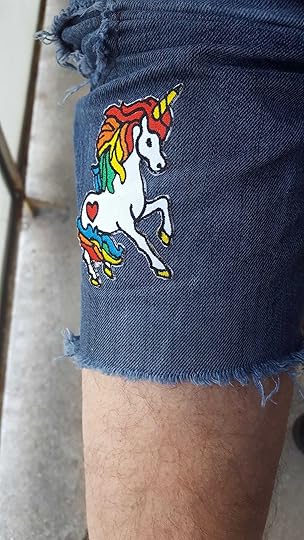 “Coffee at Kirby’s”
“Coffee at Kirby’s”Sunday morning, an intimate calls, “What are you up to?”
“Making coffee, drop by.”
By 2pm, a dozen or so in my then apartment on Homewood, spiking coffee. Me rotating CDs, a multi-disc tray on shuffle. She loves to play hostess.
“Coffee at Kirby’s! Come over.”
Tunes. Raucous laughter. Pass a baby-blue bong named “Flipper.”
First course. She whips up some righteous fried egg sammies.
Boys step out to pick up a two four of Molson Dry at the Beer Store on Gerrard.
More dance music, frivolity. Sweet love, puffs, cheers between friends.
“To Coffee!” We all slap happy.
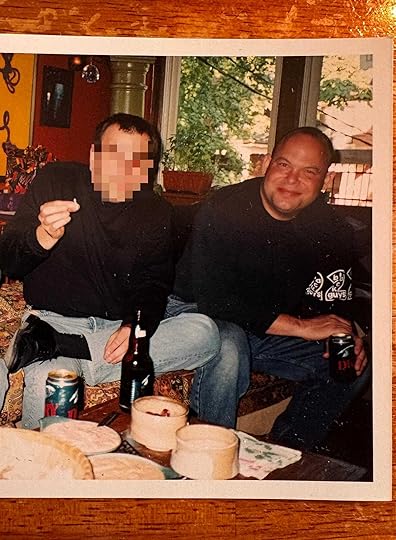 Circa 1997 when “dry” beer became a thing (Photo: Don Pyle)
Circa 1997 when “dry” beer became a thing (Photo: Don Pyle)Second course (7pm?), grilled cheese (it’s all she had in her gay fridge, that and condiments, a “tub” of Hellmanns I was made fun of/shamed for).
This 12-hour day referred to as “Coffee at Kirby’s” evolved to “Pretty Sundays” where I would spin and entertain on my (iconic) balcony on Church Street.
As CHIC exclaimed, “Good Times.”
That’s how queers thrive. We make/bring good times:
Good times, these are the good times
Leave your cares behind, these are the good times
Good times, these are the good times
Our new state of mind, these are the good times
Happy days are here again
The time is right for makin' friends
Let's get together, how 'bout a quarter to ten
Come tomorrow, let's all do it again
 Assorted Kirby+friends queer mixes.
Assorted Kirby+friends queer mixes. Like you, music has always been central to my queer being. My first mix tapes/discs to tricks and lovers, nights at the Eagle. Flaming bottles of poppers across the floor of The Barn. Funky 70s porn soundtracks. Beats pumped through tinny speakers at the baths. Soaring divas. Jazz throughout the day, and every single night streaming the new & familiar that always reminds and transports me to fairyland.
And I heard that there's a special place
Where boys and girls can all be queens every single day
And like the angel Chappell Roan (all the flowers, I’m living for it)
Oh mama, I'm just having fun
On the stage in my heels
It's where I belong down at the
How music has been not only an essential lifeline, but the maker/marker of movements, how we got through things, what lifts, carries us forward, the stuff of life itself.
Marching down 5th Avenue, the first time ever for NYC’s Gay Pride Parade, I had joined the Judy Garland Kazoo & Tambourine Marching Band tooting my sweet ass off behind a flatbed of ginormous speaker towers entering a gauntlet of mounted police protecting St. Patricks on one side, “FAGS BURN IN HELL” believers on the other, “TOOT-TOOT (hey, BEEP-BEEP!)” and a gay scoot past their bible-thumping hate-filled ugly as fuck faces.
White. X-tian. Hate. Kills. Anything. Everything. Other. Still.
Sister Sledge “I got all my sisters with me.” Slays. Not with a AK-57. Not a pipe-bomb. A rapturous queen on a kazoo shirtless in boxers giving as though their very life depends on it. Did then. Does now.
I implore, “Dance with me and my sister Jesus!,” named LeRoy, in full cop regalia, mirrored glasses, leather cap/skirt, sucking back a cherry cola and a smile.
Why Madonna matters.
“Dance and sing, get up and do your thing.”
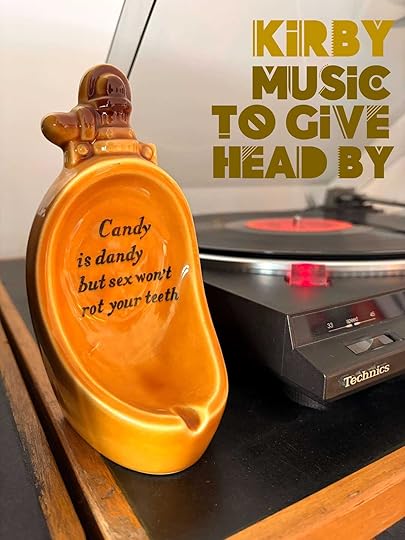
To celebrate, I’m launching this new series, Music To Give Head By, mostly because at 66, I simply want to have fun (while providing a much needed public service). Everybody knows: A good playlist sets the stage for great head.
That, and it brings such joy to share with you the origins of such, that which keeps me, my fairy, here.
“I’m going to carry on.”
Liberation baby. Nothing less.
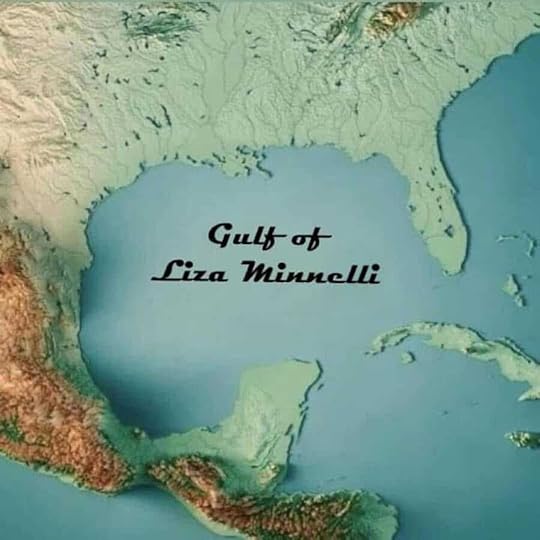 A gulf I can swim in. (Source: Tony Case/Instagram)
A gulf I can swim in. (Source: Tony Case/Instagram)I did go see the new Liza doc at the Revue. For fans of Liza (we are legion), familiar terrain focused entirely on her early career with mother Judy Garland and subsequent breakout performance in Cabaret. If anything, it shows the significance “handlers,” including mentors/friends, are, and how fame is its own centrifugal force that once in a while lands (however briefly) but is just as likely to carry you off. Still, unmistakably the one & only. My Liza (with a Z).
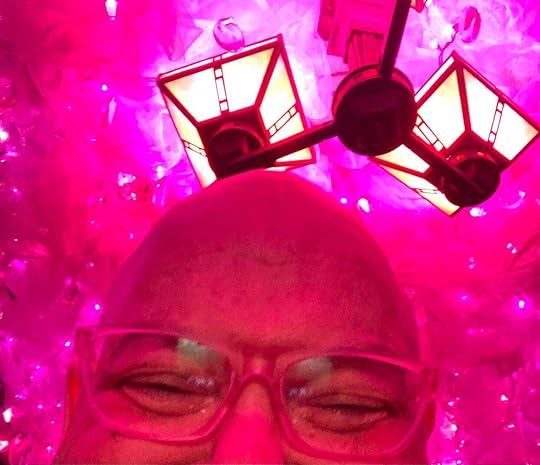 “Oh mama, I’m just having fun”
“Oh mama, I’m just having fun”
 KIRBY MUSIC TO GIVE HEAD BY premieres Valentine’s Weekend w/Special Guest STEVIE MANNING Support Send My Love to Anyone
KIRBY MUSIC TO GIVE HEAD BY premieres Valentine’s Weekend w/Special Guest STEVIE MANNING Support Send My Love to AnyoneSupport Send My Love to Anyone by signing up for a monthly or yearly subscription, liking this post, or sharing it!
Big heartfelt thanks to all of the subscribers and contributors who make this project possible!
ConnectBluesky | Instagram | Archive | Contributors | Subscribe | About SMLTA
February 15, 2025
Send My Love to Anyone | Issue 43
Hello SMLTA Readers,
Send My Love to Anyone has an exciting Issue 43 with poetry from ’s new collection Unravel and ’s new book Commonwealth. Plus a love poem by Hollay Ghadery.
Ben Ladouceur gives us a sneak peek into his debut novel, I Remember, and treats us with two beautiful micro fictions.
offers a loving tribute to poet, editor, and community organizer Jim Johnstone in their latest column, and I write about creative breakthroughs and share a new writing prompt on voice.
Send My Love to Anyone is a reader-supported publication. To receive new posts and support this project, consider becoming a free or paid subscriber.
Hope you enjoy the latest issue!
Please like or share and consider supporting SMLTA with a yearly subscription. Money raised from subscriptions goes to paying honorariums for original unpublished fiction, poetry, and essays.
Want to know more about Send My Love to Anyone visit the About section!
Kathryn
Thanks for reading Send My Love to Anyone! This post is public so feel free to share it.
Join the conversation!Alan, the toilet is still running, a snake-hissing sound and at first it only came and went and I figured it was Mira in the basement having a shower or something like that but then I remembered she up and left, cleared out her place, so I lifted the lid of the tank and watched the water seeping and I fiddled with the lever and looked at all the small bits inside and watched them going up and down and sideways, sort of, and still it kept running","size":"md","isEditorNode":true,"title":"When you die, you might come back. The Reverend said.","publishedBylines":[{"id":2737352,"name":"Sandra Campbell","bio":null,"photo_url":"https://bucketeer-e05bbc84-baa3-437e-... Substack","primaryPublicationId":1303342}],"post_date":"2025-01-25T06:25:49.253Z","cover_image":"https://substack-post-media.s3.amazon... My Love to Anyone","publication_logo_url":"https://substackcdn.com/image/fetch/f...
With my chest and cheek against the wall of Truxx, I felt a sudden strong need for something familiar. My situation was intolerably unreal; seeing a friendly face, one that saw me back, would confirm my own existence to me. I searched the corner of the bar that fell in my limited field of vision. I looked for John and couldn’t find him. I made eye contact with the man to my right, who was pressed against the wall as well, by an officer of his own. In his face, I saw no trace of panic—only disbelief. He shook his head at me and rolled his eyes. It helped my anxiety subside, to focus on the ridiculousness of the situation. We had all been drinking beers and listening to music. We did not deserve walls against our faces. I looked forward to the end of this whole exercise, so we could all buy more beers and debrief. I let out one curt laugh—then felt a sharp jab on my shoulder blade.","size":"md","isEditorNode":true,"title":"I made eye contact with the man to my right, who was pressed against the wall as well, by an officer of his own. ","publishedBylines":[{"id":21201715,"name":"Kathryn Mockler","bio":"I’m an award-winning fiction writer, poet, experimental filmmaker. I run the newsletter Send My Love to Anyone and teach creative writing at the University of Victoria. ","photo_url":"https://substack-post-media.s3.amazon... My Love to Anyone","publication_logo_url":"https://substackcdn.com/image/fetch/f...
Nearby chest freezer sings
luxurious in its electric hums,
akin to Fords clearing customs,
stop and go and stop and go,
a gunmetal calm of Fender
tube amp electric buzz, anxious, ","size":"md","isEditorNode":true,"title":"Nations and borders organize wealth and power against those same people they demand wave their pretty multicoloured rags...","publishedBylines":[{"id":50522372,"name":"D.A. Lockhart","bio":"Writer. Researcher. Editor. Lenape. Turtle Clan. Waawiiyaatanong-based. Displaced Hoosier. Trained but lapsed librarian. ","photo_url":"https://bucketeer-e05bbc84-baa3-437e-... Miscellany ","primaryPublicationId":1158972}],"post_date":"2025-01-25T05:58:26.472Z","cover_image":"https://substackcdn.com/image/fetch/f... ","id":154579720,"type":"newsletter","reaction_count":2,"comment_count":0,"publication_name":"Send My Love to Anyone","publication_logo_url":"https://substackcdn.com/image/fetch/f...
Look at this list. [Though by no means “complete”] here are sixty Canadian poets who I’ve more or less lived with, read, this past decade. Spines I lovingly caress as I walk down my hall. These names “my familiar.”
Every time I move into a new creative shift where I have breakthrough—usually a change in voice or tone or storytelling approach—I always have a period of inactivity sometimes six months to eight months where I don’t write in this new way but feel a sort of bubbling up of excitement, anticipation, and all I can do it wait.","size":"md","isEditorNode":true,"title":"This is not writers’s block. This is process.","publishedBylines":[{"id":21201715,"name":"Kathryn Mockler","bio":"I’m an award-winning fiction writer, poet, experimental filmmaker. I run the newsletter Send My Love to Anyone and teach creative writing at the University of Victoria. ","photo_url":"https://substack-post-media.s3.amazon... Count","id":154779983,"type":"newsletter","reaction_count":7,"comment_count":4,"publication_name":"Send My Love to Anyone","publication_logo_url":"https://substackcdn.com/image/fetch/f...
February 8, 2025
I am the word ramify, expansive with consequence.


Thanks for reading Send My Love to Anyone! This post is public so feel free to share it.
Tolu Oloruntoba was born in Ibadan, Nigeria, where he studied and practiced medicine. He is the author of two collections of poetry, The Junta of Happenstance , winner of the Canadian Griffin Poetry Prize and Governor General’s Literary Award and Each One a Furnace , a Dorothy Livesay Poetry Prize finalist. He gave the 2022 League of Canadian Poets Anne Szumigalski Lecture, and is a Civitella Ranieri fellow.Unravel by Tolu Oloruntoba. Copyright © 2025 Tolu Oloruntoba. Reproduced with permission from McClelland & Stewart, Penguin Random House Canada. All rights reserved. Text within this block will maintain its original spacing when published
Unravel
by Tolu OloruntobaPenguin Random House Canada
Text within this block will maintain its original spacing when published
Unravel
by Tolu OloruntobaPenguin Random House CanadaA poetic exploration of the cyclical philosophy of dismantling and remaking, Unravel is a moving and inventive rove through what could happen in the deconstructed aftermath of person and world.
Support Send My Love to AnyoneSupport Send My Love to Anyone by signing up for a monthly or yearly subscription, liking this post, or sharing it!
Big heartfelt thanks to all of the subscribers and contributors who make this project possible!
ConnectBluesky | Instagram | Archive | Contributors | Subscribe | About SMLTA
Gatherings - February 2025
Send My Love to Anyone is a reader-supported publication. To receive new posts and support this project, consider becoming a free or paid subscriber.
My NewsThanks so much to for inviting me to chat about writing and process on !
 Women WritingFeatured Writer: Kathryn MocklerWelcome to Women Writing! Dinah Laprairie and I are busy planning our 2025 Rekindle Creativity Women’s Writing Retreats. Lots of folks let us know they’d love a weekend getaway, so we’re doing it! We’re planning a retreat in beautiful French River, Ontario in the spring—and after this long winter we’ll be ready for it. The second will be our 5-day retreat in the fall…Read more12 days ago · 10 likes · 7 comments · Liisa Kovala
Women WritingFeatured Writer: Kathryn MocklerWelcome to Women Writing! Dinah Laprairie and I are busy planning our 2025 Rekindle Creativity Women’s Writing Retreats. Lots of folks let us know they’d love a weekend getaway, so we’re doing it! We’re planning a retreat in beautiful French River, Ontario in the spring—and after this long winter we’ll be ready for it. The second will be our 5-day retreat in the fall…Read more12 days ago · 10 likes · 7 comments · Liisa KovalaDelighted to have poems included in this anthology on the climate crisis and mental health which is part of Quill & Quire’s spring poetry preview!
hollayghadery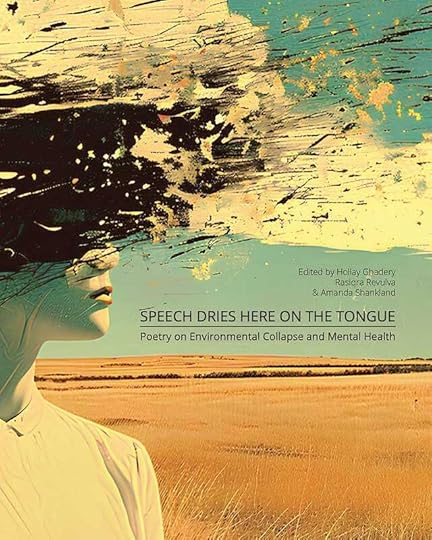 A post shared by @hollayghaderyKirby NewsKirby Reviews Unwashed by Daniel Maluka in
The Fiddlehead
A post shared by @hollayghaderyKirby NewsKirby Reviews Unwashed by Daniel Maluka in
The Fiddlehead
KIRBY #thesalonseries #M2GHB
SPINS MUSIC TO GIVE HEAD BY w/Special Guest STEVIE MANNING
16/02
Deets to follow.
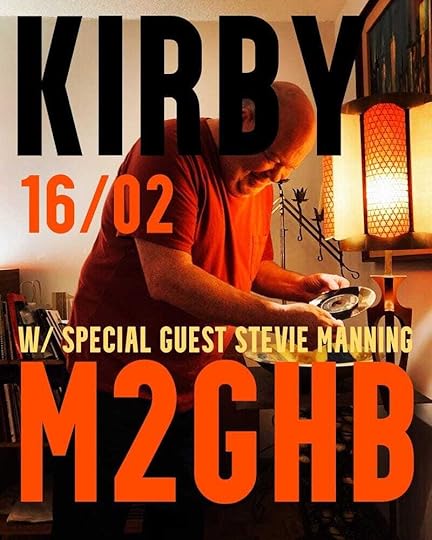 Upcoming Events
Upcoming Events
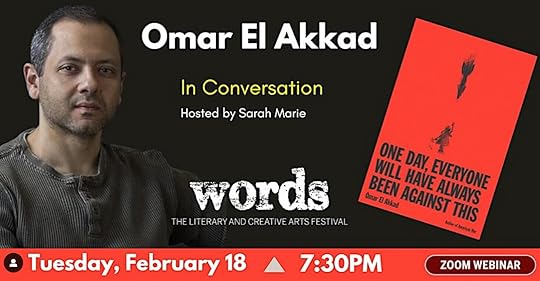
Join Words Festival for a visit with award-winning novelist and journalist Omar El Akkad to talk about his new book, One Day, Everyone Will Have Always Been Against This, a powerful reckoning with what it means to live in a West that betrays its fundamental values. February 18th at 7:30pm EST on Zoom. Hosted by Sarah Marie.
Register for this free event on Eventbrite
Planet Earth Poetry in VictoriaJoin Planet Earth Poetry at New Horizons in James Bay at 2pm, on Friday, February 21 for poet Barbara Tran.
Doors at 1:30pm, with sign-up for open mic.
New Horizons Centre is at 234 Menzies St. in James Bay (street parking only). Please note that unlike our evening readings, the afternoon readings will not be livestreamed or recorded.
Check out Planet Earth Poetry’s upcoming events.
will be visiting UVic on February 27, 2025 - All Welcome!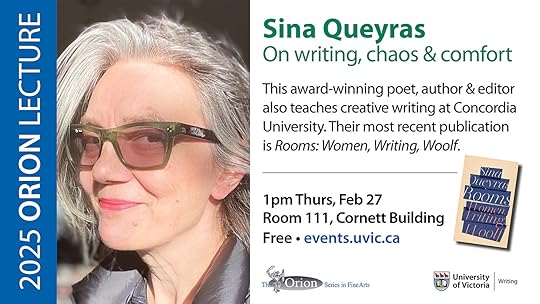 Sina Queyras (they/them) is the author, most recently of Rooms: Women, Writing, Woolf and of the poetry collections, My Ariel, MxT, Expressway and Lemon Hound — all from Coach House Books. Their work has been nominated for a Governor General’s Award, and won The Friends of Poetry Award from Poetry Magazine, a Lambda Award, the ReLit, a Pushcart Prize and Gold in the National Magazine Awards; they have twice won the Pat Lowther and the AM Klein Award for Poetry.Their first novel, Autobiography of Childhood, was nominated for the Amazon.ca First Novel Award. In 2005 they edited Open Field: 30 Contemporary Canadian Poets (Persea Books) and, with Erin Wunker and Genevieve Robichaud, they edited Nicole Brossard: A Reader. Queyras is founding editor of Lemon Hound. They have taught creative writing at Rutgers, Haverford and currently curate Writers Read at Concordia University, where they also teach creative writing.FYIthecapilanoreview
Sina Queyras (they/them) is the author, most recently of Rooms: Women, Writing, Woolf and of the poetry collections, My Ariel, MxT, Expressway and Lemon Hound — all from Coach House Books. Their work has been nominated for a Governor General’s Award, and won The Friends of Poetry Award from Poetry Magazine, a Lambda Award, the ReLit, a Pushcart Prize and Gold in the National Magazine Awards; they have twice won the Pat Lowther and the AM Klein Award for Poetry.Their first novel, Autobiography of Childhood, was nominated for the Amazon.ca First Novel Award. In 2005 they edited Open Field: 30 Contemporary Canadian Poets (Persea Books) and, with Erin Wunker and Genevieve Robichaud, they edited Nicole Brossard: A Reader. Queyras is founding editor of Lemon Hound. They have taught creative writing at Rutgers, Haverford and currently curate Writers Read at Concordia University, where they also teach creative writing.FYIthecapilanoreview
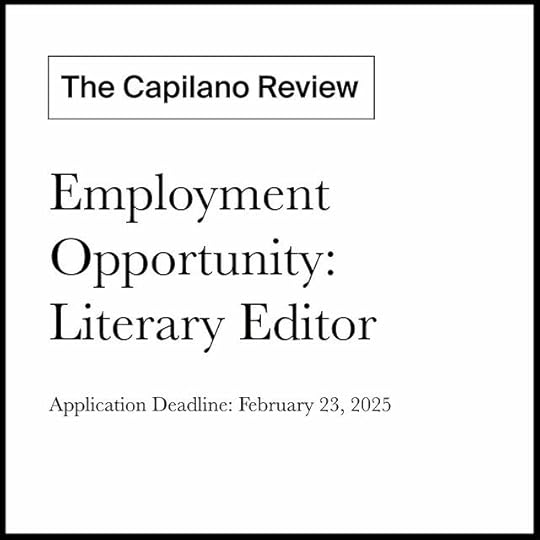 A post shared by @thecapilanoreviewWhat I’m Readingwawog_to
A post shared by @thecapilanoreviewWhat I’m Readingwawog_to
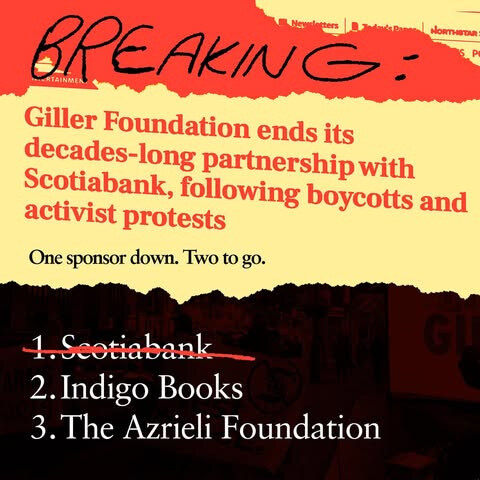 A post shared by @wawog_toTwo jurors withdrew from Giller Prize in the weeks before news of Scotiabank split
A post shared by @wawog_toTwo jurors withdrew from Giller Prize in the weeks before news of Scotiabank splitPeter Kropotkin, the Prince of Mutual Aid, JSTOR
Many authors and other workers in the books sector have joined a boycott of the Giller, saying they won’t submit their works or engage with the November prize until the award also severs ties with sponsors Indigo Books and the Azrieli Foundation.
Protesters object to the Giller’s partnerships with Indigo for its CEO’s charity that supports Israeli Defense Force officers from abroad, as well as the Azrieli Foundation, in part for its connection to Israeli real estate company Azrieli Group, which has a stake in Bank Leumi. The United Nations Human Rights Office has included Bank Leumi on a list of businesses involved in activities relating to settlements in the occupied Palestinian territory.
is reading books by women from around the world:
Mutual aid is a voluntary system of cooperation, exchange, and collaboration for the common benefit. The phrase has been heard more and more this century as states reveal themselves to be less than resilient in the face of natural and unnatural disasters. This directory of mutual aid groups in New York City, for instance, shows the range of resource/skill sharing going on.
The idea of mutual aid is much older than its present resurgence. Cooperation, after all, has been fundamental to human history. And mutualism, as symbiotic cooperation is called in biology, is vital to life itself. As the Russian prince turned anarchist Peter Kropotkin argued more than a century ago with the subtitle of his Mutual Aid (1902), it is “a key factor of evolution.”
 Books and LiliesWhere Are The Daughters Of Queen Nzinga?Although this is only the third country in my reading women project, patterns are already emerging. For one: as go the women, so goes the country…Read more5 days ago · 11 likes · 15 comments · Lilian Nattel 📚♀🌏Aisha Gawad and Lisa Ko on What Really Happened at the Albany Book Festival by Fariha Róisín in Lit Hub
Books and LiliesWhere Are The Daughters Of Queen Nzinga?Although this is only the third country in my reading women project, patterns are already emerging. For one: as go the women, so goes the country…Read more5 days ago · 11 likes · 15 comments · Lilian Nattel 📚♀🌏Aisha Gawad and Lisa Ko on What Really Happened at the Albany Book Festival by Fariha Róisín in Lit HubLisa Robertson shares an interview from Granta: Novelness: A Conversation with Kate Briggs and republished in Robertson’s newsletter, Office for Soft ArchitectureWhen asked what this time has revealed to her, Ko shared the following: “First and foremost, the real horrors of genocide and war should remain the focus. This is just one small incident in a far broader wave of censorship and repression. It has also been clarifying. What does it say when institutions are this invested in trying to mischaracterize writers, going so far as to fabricate lies to create a certain narrative—to what purpose, and to what end? Why is solidarity during this time so dangerous that they are working this hard to stop it?”
Rachel Gerry explores plotless queer fiction in The WalrusA fiction is made; in the simplest sense it’s a falsework. It changes the status of a description by shifting its context, by adding an outside to it, something not necessarily observed: maybe this outside is intuited, or borrowed. Or perhaps it enlarges or augments an aspect of the observed or the experienced in order to make a site for thinking otherwise. The poet Stacy Doris called this ‘delusional space’. My sense is that the fictive description is ludic. It enlarges the sense of the possible in several ways. One is by giving weight to an underrepresented margin, making a record, as you say, of the experience of those traditionally omitted from descriptions of the world.
Foreshadowing Tips by Tiffany Yates MartinQueer fiction is having something of a moment. Publications like the New York Times and the Guardian have been covering the rise and proliferation of the queer romance genre in particular, with op-eds praising “much needed representation” and happy endings that refute the all-too-common twentieth-century literary trope of coupling queer love with psychosocial ruin. Alongside the boom of more formulaic queer romances, I’ve been noticing a shadow boom in the paperbacked realm of plotless fiction: a weird, cerebral counterpart to this more mainstream trend. Those queer plotless books I loved most this year—a sample size to be sure, but a memorable one—are not engaged, as the romances are, in reimagining queer endings. Instead, they speak to queer ongoingness. Awake to the ways in which queer people have long carved new models for conducting life outside of heterosexual narratives, these books are invested in the ways one flips the script on the page, imposes one’s will, creates something new.
An excellent overview of how foreshadowing operates in fiction.
reviews all our ordinary stories by Teresa Wong in
Foreshadowing is a literary device in which future developments in a story are hinted at before they happen, presaging what’s to come. It adds dimension to stories just as shading and shadow add it to visual images: Foreshadowing can heighten suspense and tension, increase momentum, raise a story’s stakes, deepen and develop characters, and pave in key plot developments to give the story more cohesion.
But just as in visual art, the finesse of foreshadowing is in how and where you direct the reader’s attention: How much you use, where, and what effect it creates in the story. The artist achieves those results using dark and light tones. Authors have a similar palette to work with: various shades of direct and indirect foreshadowing.
 Zine of a WriterReview of all our ordinary stories, by Teresa Wongall our ordinary stories, by Teresa Wong, is actually the first graphic novel I’ve ever read and up until now I didn’t quite understand how text and illustration could go together to tell a whole story. Or I guess I didn’t understand the role of the images and, in this book at least, of the negative space in telling the story between the lines of the te…Read more2 days ago · 4 likes · Susan Sanford BladesK.R. Wilson releases 250 Capsule Book Reviews
Zine of a WriterReview of all our ordinary stories, by Teresa Wongall our ordinary stories, by Teresa Wong, is actually the first graphic novel I’ve ever read and up until now I didn’t quite understand how text and illustration could go together to tell a whole story. Or I guess I didn’t understand the role of the images and, in this book at least, of the negative space in telling the story between the lines of the te…Read more2 days ago · 4 likes · Susan Sanford BladesK.R. Wilson releases 250 Capsule Book ReviewsMore than a few familiar names here! K.R. Wilson has been doing capsule book reviews since 2019! Neat to see two of my books and two of Kirby’s books here.
Hollay Ghadery offers tips on Tips on How to Write a Love PoemWhat I’m Listening ToI think the best love poems marry the universal experience of being in love with your individual feeling of being in love with a specific person. Think about your experience of being in love: the details about the person for whom you feel love—what about them attracts you? And not just physically, but what about the way they act and who they are at the core of their being attracts you? Or, what is it about the way you feel when you’re with them that’s so singular? Or even the way you feel when you’re without them?
 Women Writing Episode 6: Coffee Break with Hollay GhaderyWelcome to the Women Writing podcast. In this episode, I’m having a chat with poet, memoirist, short story writer, publicist, and founder of River Street Writing, Hollay Ghadery, to discuss her writing, her work as a publicist, and the importance of literary communities. You can learn more about Hollay in her Women Writing… Listen now24 days ago · 8 likes · 1 comment · Liisa KovalaWhat I’m Watching
Women Writing Episode 6: Coffee Break with Hollay GhaderyWelcome to the Women Writing podcast. In this episode, I’m having a chat with poet, memoirist, short story writer, publicist, and founder of River Street Writing, Hollay Ghadery, to discuss her writing, her work as a publicist, and the importance of literary communities. You can learn more about Hollay in her Women Writing… Listen now24 days ago · 8 likes · 1 comment · Liisa KovalaWhat I’m WatchingSaw this beautiful documentary at a screening at UVic. This film is making the rounds at film festivals. Highly recommend this beautiful but painful.
Read more about Aisha’s Story.
“Food is the most precious part of Palestinian heritage.”
Aisha Azzam and her husband started their family grain mill in Baqa’a refugee camp, Jordan, 35 years ago. She treasures her role in safeguarding culture by milling the wheat, grains, and herbs essential to Palestinian cuisine. Through food, Aisha traces the story of Palestinian displacement and rebuilding family and community in a refugee camp. Harvesting, milling, cooking, and feasts ground the film’s arc of displacement, longing, and resistance. In Aisha’s words, “Food is what keeps us together as Palestinians.”
Aisha’s Story intimately captures the loss, beauty, and steadfastness that define Palestinian lives.
The Floating Man, an experimental documentary by
Inspired by Agnès Varda, The Floating Man unpacks gender in fresh and dynamic ways. Sourcing his art practice and archives, writer-artist-filmmaker Michael V. Smith examines a lifetime of untrue stories about his body. In this unique blend of DIY documentary, art film, and videopoem, The Floating Man reveals an intimate self-portrait by a self-described sissy. This is a timely film examining the fictions of gender and the power of art to transform a life.
This is an excellent workshop on writing dialogue naturally with Catherine Hernandez.
Somebody Somewhere Season 3 is so good!
I’m on the first season of Dark, so far so good. Nice escapist story of time travel to the 80s.
Share your news or what you’re reading or watching in the comments!will you say it’s okay?
Thanks for reading Send My Love to Anyone! This post is public so feel free to share it.
Hollay Ghadery is a multi-genre writer living in Ontario on Anishinaabe land. She has her MFA in Creative Writing from the University of Guelph. Fuse , her memoir of mixed-race identity and mental health, was released by Guernica Editions in 2021 and won the 2023 Canadian Bookclub Award for Nonfiction/Memoir. Her collection of poetry, Rebellion Box was released by Radiant Press in 2023, and her collection of short fiction, Widow Fantasies , is scheduled for release with Gordon Hill Press in fall 2024. Her debut novel, The Unraveling of Ou , is due out with Palimpsest Press in 2026, and her children’s book, Being with the Birds , with Guernica Editions in 2027. Hollay is a co-host of Angela’s Bookclub on 105.5 FM, as well as HOWL on CIUT 89.5 FM. She is also a book publicist and the Poet Laureate of Scugog Township. Learn more about Hollay at www.hollayghadery.com.Support Send My Love to AnyoneSupport Send My Love to Anyone by signing up for a monthly or yearly subscription, liking this post, or sharing it!
Big heartfelt thanks to all of the subscribers and contributors who make this project possible!
ConnectBluesky | Instagram | Archive | Contributors | Subscribe | About SMLTA
February 1, 2025
I made eye contact with the man to my right, who was pressed against the wall as well, by an officer of his own.
With my chest and cheek against the wall of Truxx, I felt a sudden strong need for something familiar. My situation was intolerably unreal; seeing a friendly face, one that saw me back, would confirm my own existence to me. I searched the corner of the bar that fell in my limited field of vision. I looked for John and couldn’t find him. I made eye contact with the man to my right, who was pressed against the wall as well, by an officer of his own. In his face, I saw no trace of panic—only disbelief. He shook his head at me and rolled his eyes. It helped my anxiety subside, to focus on the ridiculousness of the situation. We had all been drinking beers and listening to music. We did not deserve walls against our faces. I looked forward to the end of this whole exercise, so we could all buy more beers and debrief. I let out one curt laugh—then felt a sharp jab on my shoulder blade.
“Qu’est-ce qu’il y a de si drôle?” asked the officer, considering himself the subject of the laughter.
A different cop shouted, “This way for the paddy wagons, ladies,” and I understood that I wouldn’t be returning to my table or buying another beer. That I had been foolish to think of that, even for a moment. Previous raids had resulted in small numbers of arrests, but this one had a different magnitude. I was being arrested, same as everyone else there.
My cop held both my hands behind me, peeled me off the wall, and led me through the exit. The cop behind us walked more quickly, and as he passed, the man in his grip looked into my eyes and said sharply, “Do you see?” He was speaking to me in particular.
“Honoré,” I said, recognizing him more by his voice than his face. He had grown a beard since our last encounter. As he was shoved forward, he turned his head to keep my gaze. His face was intense with scorn.
There were several paddy wagons parked outside the bar, one of them already full of men; Honoré’s cop shoved him into that vehicle and chained him to the bench in a swift motion. Honoré looked at me again, but this time his face conveyed terror. The door slammed shut; the wagon drove off.
Usually, when Honoré and I saw each other, at some bar or bathhouse, we would pretend not to see each other and not even say hello—though every several months, we scrapped this unratified agreement and spent a whole evening speaking. He had broken the agreement now, to share some unkind words. Do you see, he had said. I knew what he meant by this: Do you see what it leads to? The open life, the free life. Sitting in places like this. Do you see what we do to ourselves? What we’ve done to ourselves already, by deigning to forget, for even a moment, our station?
But it hadn’t mattered to me, in that moment, that his words were unkind. I derived comfort from them. A man had spoken three words to me—to me in particular—so I knew that I existed.
*
At the Reine Elizabeth, I manned a windowless, closet-sized room within the kitchen, with a dumbwaiter and a shelf with a few recipe books, all French. My job was to make drinks for the people who didn’t want to leave their rooms. When I had no drinks to make, I was supposed to wash the dishes that accumulated in the sink outside the little room.
After a few shifts, I noticed that sometimes the other dish boys were pulled to the bar if things were getting busy and the boys had proper clothes on. I decided I’d start to wear a good shirt to work, and I’d hope for the same opportunity. Just one shift at the bar would mean I would share in the tip money that got pooled that night.
I had a nice white shirt at the room-rent in Little Portugal, so I took a walk there one afternoon. By this time, I had been sleeping at Honoré’s practically every night. Tomas’s mother, Gloria, sat alone on the couch reading a magazine when I arrived. “Tomas is in my mother’s bed, sick. He puked on the sidewalk after the movies this afternoon. His vo-vo is out shopping right now.”
“I’m not staying,” I said. “I’m just getting some clothes.”
“Sit with me. There’s coffee.”
I poured myself up. She put aside her magazine and bit her lip before speaking. “You know, I think my mother isn’t very happy with this arrangement. She wants to replace you actually, but she’ll never say that to you. You know she doesn’t want just the income. She wants English practice, help around the house. That was the idea.”
I nodded.
“Not that there’s anything wrong with you. You’re young, you’re having fun, and that’s what you should be doing. You don’t need to watch cartoons with a six-year-old all day. I’ll bet you have so many friends. Maybe a girl.” She gave a discreet, indulgent look. Hearing our chatter, Tomas came out of the bedroom, wrapped in a blanket.
“I hear you’re sick today, chief,” I said.
He didn’t speak. He just crawled onto the couch and put his head on my lap and his feet in Gloria’s lap.
Maria arrived next, coming through the main door with arms full of paper bags.
“I’m leaving,” I said to her. “I can pay for the week and get my stuff out today.”
“Yes,” she said. “Okay.”
She and her daughter headed to the kitchen to unload the groceries.
Tomas looked up at me. “I knew,” he whispered.
“What did you know?”
“I knew the popcorn makes me vomit. At the matinee. It’s the butter. It’s happened before.”
“Then why did you eat it?”
“Because I love it a lot,” he said, tearing up. “It’s my favourite.” He stifled a big sob.
“I understand,” I told him. “It’s really tough.” I wiped his tears away and kissed him on the forehead, and once I knew he was asleep again, I carefully removed myself from below his head. Maria came back in, with some of the boxes she kept behind the sink skirt in the kitchen. We fit all my stuff into just one box though, and she and I shared a light moment, laughing about how little I had to pack. Some pairs of jeans, a turtleneck, a few tank tops—and my one nice-collared shirt, still clean and bright white.
Maria offered to help me get a cab outside.
“I’ll take the Metro,” I said.
She yelped: “No! You cannot!” I knew already that she was suspicious, even frightened, of the new underground system. I tried to reason with her, but she put the cash for the cab between the flaps of my box. I mentioned nothing about having taken the Metro around town many times already. Then she kissed my cheek. I wanted to tell Tomas goodbye but didn’t want to wake him.
Maria said, “Wait now.” She looked behind her to make sure Gloria was not near, and then she looked down at her hands, which played with the apron strings tied over her stomach. “I do not know this person you have. But I know, there is person, and I know he is…”
She jutted her shoulders forward, uncomfortable saying more here. “He” was all she needed to say to establish her point.
“I know it that you will…smarten up. Smart boy here. But listen to me. You must do quick. You will be a husband soon. And your wife cannot know.”
At this point she looked into my eyes instead of into her own palms.
“That will be the worst thing for the woman. But you take longer, you go further. And further. It will all be harder to…to put away. So please. Smarten up.”
She cleared her throat. Then she spoke jokingly, as though nothing she had said was all that serious. “Smarten up, young man!” she said, all jovial. She gave me a fake smack on the head and we both laughed nervously. I said goodbye and left.
On my walk to the Metro, it hit me how Maria had deduced things: underwear. Honoré’s pairs were bigger than mine, but I sometimes wore them instead of my own, because they were also much higher quality, silky instead of papery. I likely left pairs in my clothes bin, on my increasingly rare visits to the room-rent. She would have seen them and wondered why I shopped in two different sizes. Then it would have fallen into place for her. In that moment, she’d made a decision to convey something to me, some time before we spoke for the last time. She’d waited until the last minute. People do that with the tasks they find unpleasant.
I had been quiet about my private life, to her and to others. It was an issue of vocabulary. Honoré was not simply a friend, but he would never have considered us boyfriends, husbands, or lovers either, and I could not have described him that way. On the nights I spent at the room-rent, he sometimes went on dates with girls, arranged by his mother and father. But that word, date, didn’t capture the time he and I spent together. No word did, or none that was at hand. Other men at the Peel Pub used certain terms during stories.
I met a paramour at the swimming club.
A sweetheart, a gentleman, a darling.
Met eyes with a young thing. A beauty. A fruit.
But there was a sheen of irony to these terms, as though they stood in for different, more sincere language. I had yet to learn those other, accurate words; I had begun to doubt they existed at all. Riding the train with my box of clothes in my lap, I felt the earth all around me, clumpy and stable, unseen and unfathomably heavy. The excavated earth had been used to make the islands for Expo. There in the ground, where there should have been only earth, there were people like me, flung from place to place, in vehicles that moved through the dark. And where there should have been only water, over in the river, there were islands and ridiculous buildings. The water, once calm, now rushed like rapids on either side of the islands. Things were becoming possible that hadn’t been possible previously. The past was the wrong place to look for a proper understanding of the world. I felt this very strongly and clutched my cardboard box tightly.
As the train approached my stop, I resolved to be more careful about things like the underwear. More discreet. I never wanted to be spoken to again the way Maria had spoken to me, playing with her apron strings, telling me what my future would be, thinking that she knew better, or that she knew me at all. There was going to be so much love in my life—real love. It was coming for me soon; it would cover me like mud. All I had to do was wait, and a future would arrive that was limitless.
Thanks for reading Send My Love to Anyone! This post is public so feel free to share it.
Ben Ladouceur is the author of Otter, winner of the Gerald Lampert Memorial Prize, finalist for a Lambda Literary Award, and a National Post best book of the year, and Mad Long Emotion, winner of the Archibald Lampman Award. He is a recipient of the Writers’ Trust of Canada’s Dayne Ogilvie Prize for LGBTQ Emerging Writers and the National Magazine Award for Poetry. His short fiction has been featured in the Journey Prize Stories anthology and awarded the Thomas Morton Prize. He lives in Ottawa.Excerpted from I Remember Lights © 2025 by Ben Ladouceur. Used with permission of Book*hug Press.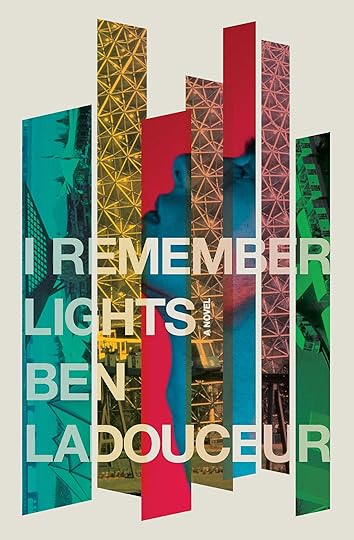 Text within this block will maintain its original spacing when published
I Remember Lights
by Ben LadouceurBook*hug Press, 2025
Text within this block will maintain its original spacing when published
I Remember Lights
by Ben LadouceurBook*hug Press, 2025The first novel from award-winning poet Ben Ladouceur, I Remember Lights depicts a time when the world promised everything to everyone, however irresponsibly.
In summer 1967, love is all you need… but some forms of love are criminal. As the spectacular Expo ’67 celebrations take shape, a young man new to Montreal learns about gay life from cruising partners, one-night stands, live-in lovers, and friends. Once Expo begins, he finds romance with a charismatic visitor, but their time is limited. When the fireworks wither into smoke, so do their options.
A decade later, during the notorious 1977 police raid on a gay bar called Truxx, he comes to understand even more about the bitter choice, so often made by men like him, between happiness and safety.
I Remember Lights is a vital reminder of forgotten history and a visceral exploration of the details of queer life: tribulation and joy, exile and solidarity, cruelty and fortitude.
Support Send My Love to AnyoneSupport Send My Love to Anyone by signing up for a monthly or yearly subscription, liking this post, or sharing it!
Big heartfelt thanks to all of the subscribers and contributors who make this project possible!
ConnectBluesky | Instagram | Archive | Contributors | Subscribe | About SMLTA
January 24, 2025
When you die, you might come back. The Reverend said.
Alan, the toilet is still running, a snake-hissing sound and at first it only came and went and I figured it was Mira in the basement having a shower or something like that but then I remembered she up and left, cleared out her place, so I lifted the lid of the tank and watched the water seeping and I fiddled with the lever and looked at all the small bits inside and watched them going up and down and sideways, sort of, and still it kept running and I tried not to hear the hissing—on then off for days on end and I couldn’t help feeling bad about of all the good clean water going to waste and who could I call for help in these pandemic days and was it safe anyways to let anyone, even a fixer into the house because how would I know where they’ve been, who they’ve slept with and that’s when I called out loud—Alan what would you do—which I’ve never done before, but maybe you know that already, and then it happened, the toilet stopped running, for no obvious reason because I hadn’t fiddled a thing, I hadn’t even lifted the lid. I waited and watched wanting so to believe that your fingers had just been inside the tank’s cold water fooling around with the screws, the lever, the gasket, not that I know what a gasket is, but you’d know for sure which is how I know your fiddling stopped the running, made this silence and I can’t stop smiling and I can’t stop thinking that it’s like Leonard Cohen said—god is alive and magic is afoot—and I start to shiver and shake and I figure maybe it’s the chill of the frozen spring day outside pretending it’s still winter and I can’t find enough to wrap around me to stop the shaking so I rummage through my sweaters and stir up a flurry of moths fat with stolen wool and I am not smiling anymore and I hear myself saying, Alan oh Alan, all I want to know is can you hear me, can you make the shaking stop?
Overheard in the parking lot of The Cardinal Funeral HomeWhen you die, you might come back. The Reverend said.
Once you’re earthed, worms will have their way with you. They’ll rip, tear, munch and chew—skin,blood,bones. Your hair too, he said- it’s the last to go. The creepy critters will shit you out, every gritty, sticky bit of you. You’ll be a speck among billions. You’re dirt, like what’s underneath your feet.
But hold on, it’s not over yet. There’re those seeds—the ones that birds poop, winds drop. They’ll land willy-nilly, then nuzzle down, feed on you, until they’re all plumped up—oh yes, and before you know it, skinny white threads drill down from their bottoms. Once landed, the sun will pull you up to nose above the dirt, wobbly and green. Sprout. Flower. Bloom.
So how’s that for resurrection?
Thanks for reading Send My Love to Anyone! This post is public so feel free to share it.
Sandra Campbell (she/her) writes fiction, non-fiction and poetry. Her novel Getting to Normal was named as one of NOW magazine’s best books. Her eco-arts productions celebrate in poetry, song and dance our inter-being with the natural world. As a community educator, her workshops invite all ages to explore the dynamics of the senses, memory and the imagination in the creative process. She makes her home as a visitor on the lands of Tkaronto.Support Send My Love to AnyoneSupport Send My Love to Anyone by signing up for a monthly or yearly subscription, liking this post, or sharing it!
Big heartfelt thanks to all of the subscribers and contributors who make this project possible!
ConnectBluesky | Instagram | Archive | Contributors | Subscribe | About SMLTA
Nations and borders organize wealth and power against those same people they demand wave their pretty multicoloured rags...
Thanks for reading Send My Love to Anyone! This post is public so feel free to share it.
D.A. Lockhart is the author of multiple collections of poetry and short fiction. His work has been shortlisted for the Trillium Book Award, Raymond Souster Award, Indiana Author’s Awards, First Nations Communities READ Award, and has been a finalist for the ReLit Award. His work has appeared widely throughout Turtle Island including, The Malahat Review, Grain, CV2, TriQuarterly, The Fiddlehead, ARC Poetry Magazine, Best Canadian Poetry, Best New Poetry from the Midwest, and Belt. Along the way his work has garnered numerous Pushcart Prize nominations, National Magazine Award nominations, and Best of the Net nominations. He is pùkuwànkoamimëns of the Moravian of the Thames First Nation (Eelūnaapèewii Lahkèewiit). Lockhart currently resides on the south shore at Waawiiyaatanong where he is the publisher at Urban Farmhouse Press.Excerpt from “Two Poets Discuss Migration and Ars Poetica over Pho at Lucky Pho 77, Chicago, Il” in Commonwealth by D.A Lockhart © 2025. Published with permission of Kegedonce Press and D.A. Lockhart. Text within this block will maintain its original spacing when published
Commonwealth
by D.A. LockhartKegedonce Press, 2025
Text within this block will maintain its original spacing when published
Commonwealth
by D.A. LockhartKegedonce Press, 2025Commonwealth is a profound lyrical meditation on the pre- and post-colonial migrations of the Lenape population throughout the American Midwest, from the watershed of Weli Sipu (the Ohio River) in the Commonwealth of Kentucky to Indiana and beyond. This is a book that transcribes the languages of rivers, highways, rail lines, and buffalo traces. It seeks—or is pushed toward—destinations that are always over the horizon. It is about the fluidity of space and time, and the tangibility of history. As the Lenape journey ever northward and westward, they both create and are created by a collective body of stories: stories of belonging and exclusion, of freedom and confinement, of aspirations and hard truths. Commonwealth explores the ways landscape and people inform one another, and does so in a way that is as clear as a broad Ohio sky.
Support Send My Love to AnyoneSupport Send My Love to Anyone by signing up for a monthly or yearly subscription, liking this post, or sharing it!
Big heartfelt thanks to all of the subscribers and contributors who make this project possible!
ConnectBluesky | Instagram | Archive | Contributors | Subscribe | About SMLTA
January 13, 2025
This is not writers’s block. This is process.
 Photo by Eugenia Pankiv on UnsplashOn Creative Shifts
Photo by Eugenia Pankiv on UnsplashOn Creative ShiftsEvery time I move into a new creative shift where I have breakthrough—usually a change in voice or tone or storytelling approach—I always have a period of inactivity sometimes six months to eight months where I don’t write in this new way but feel a sort of bubbling up of excitement, anticipation, and all I can do it wait.
While the shift is occurring—it is like bread baking—I can’t do anything to make it go slower or faster. All I can do is pay attention to what is around me (especially writing that draws me in) and to this internal tug, poking me, reminding me that it’s there and that I just have to be patient.
This is not writers’s block. This is process, and the two are very different things for me. I can and do write other things during this period—I’m just not writing THE THING that is going to be the big creative shift. Writer’s block feels hopeless and more external and focused on how the work will be perceived. The creative shift feels more internal, but unlike writer’s block, it is also comforting, exciting, and intense.
This has happened to me about five times in my writing life, so I am now used to recognizing the signs and the feeling.
Today I had the creative breakthrough that will likely see me through the next couple of years of writing.
It came in a flash—all at once. No digging, no looking for it. Just handed to me like a little present. There you go—what you’ve been waiting for. It’s the kind of thing that’s not going to be particularly exciting to anyone else. But when it happens to me, I think it is one of the best creative feelings in the world—the literary equivalent of climbing in to a bed of freshly laundered sheets.
Anyway, things are low right now in the world, in my personal life, so I’m very very happy for this creative boost today.
Writing is weird.
Writers, artists, have you experienced anything like this in your creative lives?
Support Send My Love to AnyoneSupport Send My Love to Anyone by signing up for a monthly or yearly subscription, liking this post, or sharing it!
Big heartfelt thanks to all of the subscribers and contributors who make this project possible!
ConnectBluesky | Instagram | Archive | Contributors | Subscribe | About SMLTA



